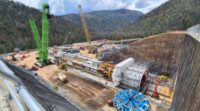URS Corp. announced strong results for its latest fiscal year, ending Jan. 2, relecting the full benefits of its 2007 acquisition of Washington Group Inc. and strength in core federal and infrastructure markets. Company executives are confident the firm is postioned strongly enough in key markets to weather current economic difficulties and be optimistic about 2010.
The engineering-contracting giant reported nearly $10.1 billion in revenue for its fiscal 2008, up 87.4% from the previous year. Net income increased 66.3% to nearly $220 million, which Chairman and CEO Martin M. Koffel labeled "record profits." Koffel attributed margin improvements largely to cost cutting. "This is the second year of improving our risk profile," he said. "There is a huge focus on discipline of execution."
Koffel told analysts that URS is "well positioned to weather this downturn," with a diverse client base through its divisions focusing on infrastructure, government and power markets. "We are not dependent on any one funding source," said Koffel. "We are not in any market that isn't the right place to be for the long term."
Koffel noted strong results in federal sector revenue, mostly generated by its Washington and EG&G divisons, noting that the corporation now counts 25 federal agencies as clients. He expects the federal sector to generate about $4.9 billion alone in fiscal 2009 revenue, about half of the corporation's total projection of $9.5 billion to $10 billion. Those projections do not include anticipated revenue from U.S. Dept. of Energy cleanup work and from work at decommissioning the U.K.'s Sellafield nuclear power complex.
Koffel also sees the federal stimulus package as a 2009 revenue booster, adding between $1.9 billion and $2 billion, claiming that 13 states where URS is well positioned are slated to receive a total of 57% of allocated funds. But he does not see that boost coming until late in 2009, as more engineering work is procured. "Our growth is not dependent on the stimulus," he says. "We saw growth in our fundamental business before the stimulus was enacted." Koffel points out that only 43% of stimulus funding is earmarked to states, with the rest for federal projects. "It's a subtle form of supplmental spending," he said.
Koffel says the company has been "pleasantly surprised" by the amount of stimulus money, at least $6 billion, earmarked for cleanup at DOE weapon cleanup sites where it is already extensively involved.
URS also sees stability in its power sector. Koffel notes that while flue- gas-desulfurization projects have been pushed back in schedule, none have been cancelled. He also notes demand for gas-fired power plants and continued strength in its nuclear power projects.
According to Koffel, URS is the "preferred contractor" on 25% of the applications for new nuclear power plants now before the U.S. Nuclear Regulatory Commission. Washington Division President Thomas Zarges says the firm is in "substantial negotiations" with a number of utilities and vendors on new technologies, but he declined to identify them or offer additional detail.
In its industrial and commercial construction sector, URS is seeing some impact from changes in oil prices, with Koffel noting that one-third of work in this niche has faced a capital spending slowdown. A slowing demand for metals has also delayed or cancelled some of the firm's mining projects. But he notes that most of the firm's work in the sector is through master service agreements "that are less sensitive to a downturn and will be stable in 2009."
Despite delays in payments from the agencies such as the California Dept. of Transportation, URS Chief Financial Officer H. Thomas Hicks told analysts that URS clients were "high quality," but he noted "we're checking credit worthinesss."
But Koffel said URS is "confident we can achieve revenue targets. This is a deep franchise and the work keeps coming."




